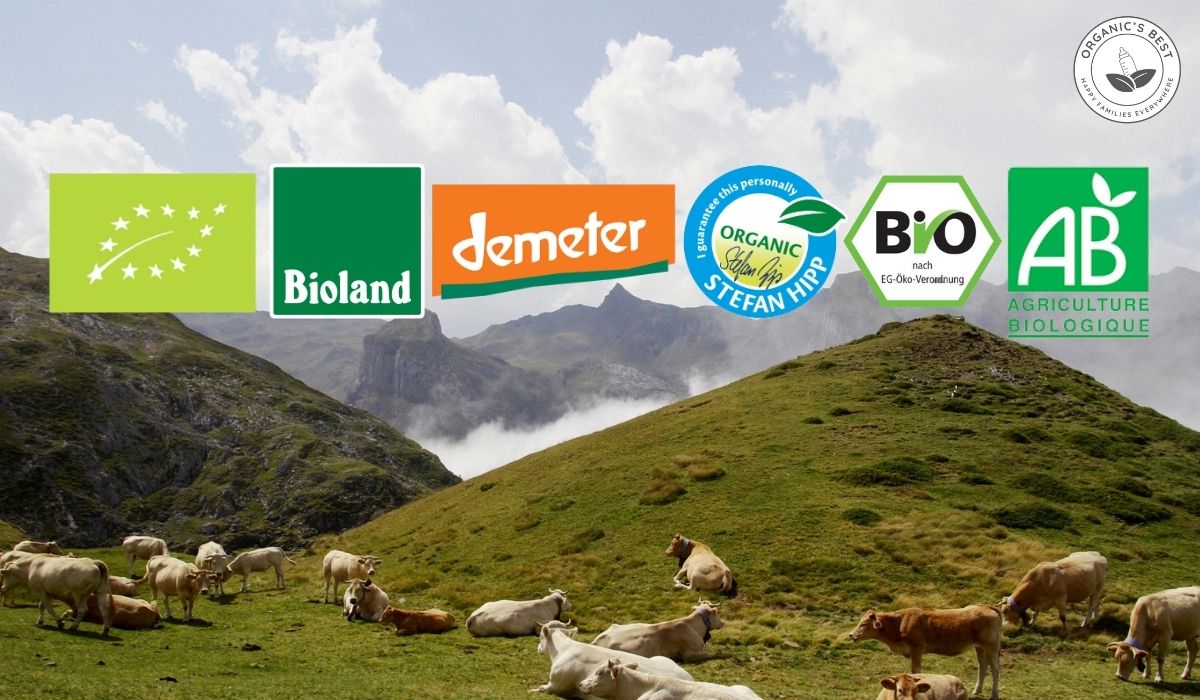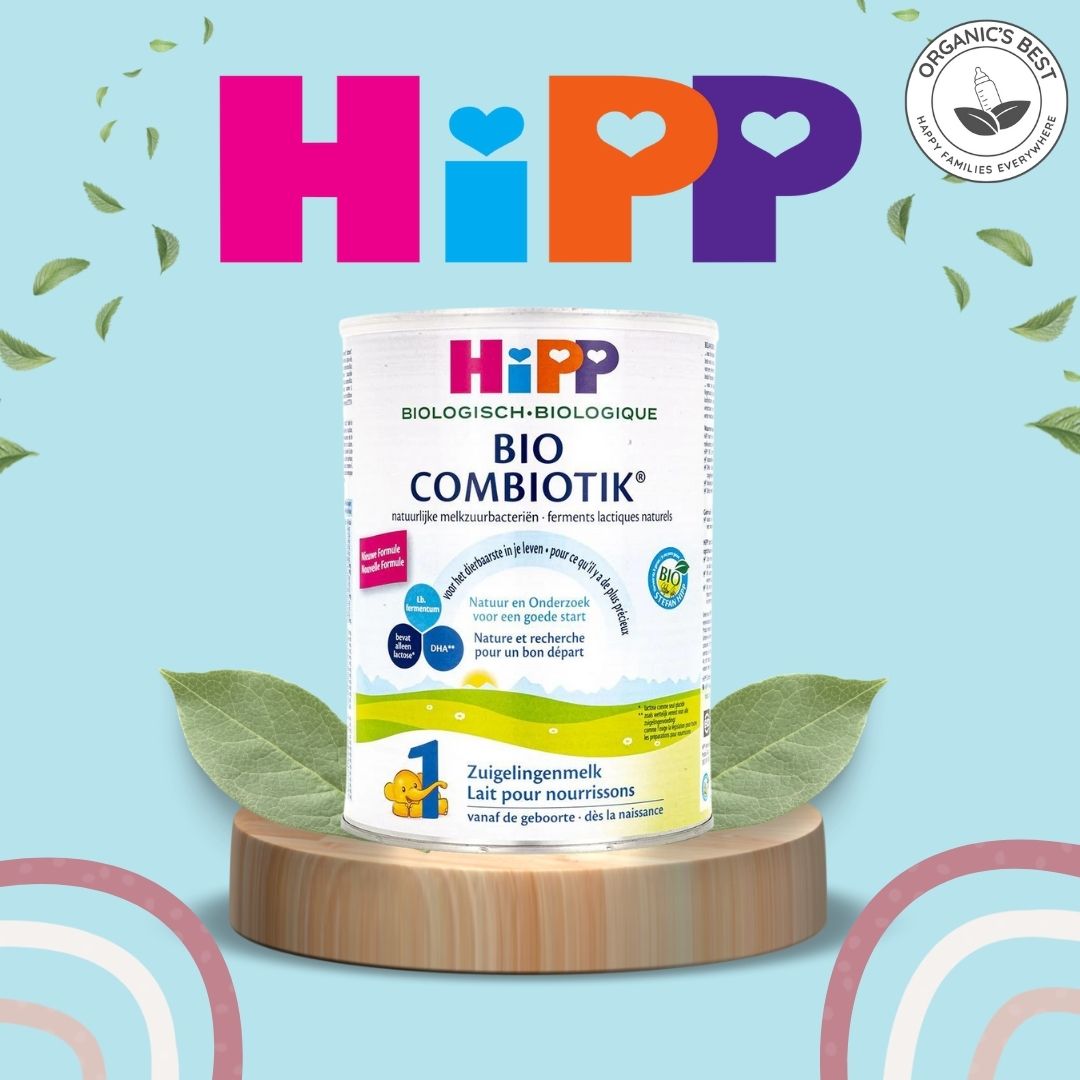Click to Get 2 FREE Boxes/Cans
Click to Get 2 FREE Boxes/Cans
Only New Customers! Click HERE to Get 2 Extra Boxes/Cans for Free With Your First Order.
Only New Customers! Click HERE to Get 2 Extra Boxes/Cans for Free With Your First Order.
BABY FORMULA
Offering new parents top-quality European infant formula from renowned brands like HiPP, Holle, Kendamil, and more. If you’re uncertain about which product to choose, our Formula Finder can help you make the best decision for your baby.
Baby Food
Offering new parents a premium selection of European baby foods, including jars, pouches, cereals, and snacks from esteemed brands like HiPP and Holle.
Different Levels Of Organic Certification In Europe
by Agustina Fernandez October 24, 2022 9 min read

Table of Contents
Many parents are choosing to feed their little ones with an organic formula and for good reason. We know that there are many benefits to choosing organic, but you may still be left with some questions such as, what criteria does a formula have to meet to be considered organic?
Are there qualities that set organic formulas apart from non-organic formulas? What are the types of organic certifications, and who sets the standards and guidelines for organic products? We are here to answer these questions and more!
To begin, there are a few reasons why choosing organic products benefits both farmers and consumers. From health benefits to environmental advances, organic farming can help maintain biodiversity, preserve ecological balances, and enhance soil fertility.
There are many rules and guidelines for labeling a product as organic that commences at the very beginning of production during the agricultural process. From seed to final product, each stage is meticulously monitored to ensure quality and control. Expert bodies, technical committees, and member states support the legislation procedures associated with organic certification and production.
Let’s take a deeper look at the production process and define the types of European organic certification, which span from the European Union, which is the overseeing control body, to private organic certifications throughout Europe.
What Does European Organic Certification Mean?

Organic certification is defined by a set of regulations for organic food, starting all the way from seed to when the final product enters the retail market. This process provides rules and guidelines to multiple sources of production, including farmers, retailers, seed suppliers, and food processors. Organic certification ensures that all products undergo a thorough product qualification process that involves quality assurance tests and product performance tests. As mentioned above, there are various types of private organic certifications throughout Europe that typically uphold and enforce standards that surpass those required by the EU. In addition, various countries within Europe, such as France and Germany, also have their own national organic regulations.
What is EU Organic?
The EU produces excellent organic certification legislation and regulations in partnership with stakeholders, experts, and the public. The organic action plan by the EU has driven innovation and investment in the organic farming sector to boost the demand for organic food in the market.
To better understand what European organic certification means, let’s look at each type of organic certification. These certifications stipulate the growing, processing, storage, shipping, and packaging of organic products.
European Union Organic

The European Union Organic certification differentiates organic food and non-organic food, with a set of strict standards that must be adhered to for a product to be considered organic. This can be identified by the EU organic logo, which is mandatory for all organic farming products sold and displayed as organic according to the stipulated rules by the EU.
For a product to become EU Organic Certified, at least 95% of the agricultural ingredients must be organic, and the other 5% must follow additional strict conditions set by the EU. Think of this as a baseline that other private or state-specific seals or certifications build upon.
Under the rules of organic production, there are several principles put in place to protect and maintain biodiversity as well as strengthen the trust of customers who purchase and consume organic products. These principles include prohibiting the use of GMOs and hormones and restricting the use of artificial fertilizers, herbicides, pesticides, and antibiotics to circumstances where it is necessary.
To support the health of the sources needed to grow strong, healthy crops such as soil, plants, and animals, farmers adapt certain agricultural practices to implement crop rotation, prohibit the use of mineral nitrogen fertilizers, prevent overstocking, and encourage the natural immunological defense of animals and pest control.
There are also several rules in place to support the health and well-being of livestock while abiding by organic principles. To name just a few, to label their products as organic farmers must feed their animals with 100% organic feed and restrict the use of hormones while providing them with open grazing areas, and suitable housing conditions.
To learn more, check out this informative video from the European Commission!
Demeter

The Demeter Association brings biodynamic farming to the organic sector. Since 1924 they have been increasing the standard for organic food production and have maintained a level of quality that surpasses EU organic regulations.
In 1992 Demeter became the first organic farming association to have comprehensive international regulations for producing and processing organic foods. They established Demeter international as a federation in 1997 with 19 Demeter organizations worldwide.
The Demeter Association recognizes the connection between agricultural practices and our health. They adhere to strict standards and principles which include regenerated soil fertility, GMO-free agriculture, and respect for all animals.
The aim of biodynamic farming is to use a holistic approach that values soil health, regeneration, and diversified ecosystems. The use of genetic engineering is replaced with plant and animal breeding. This breeding system, which prioritizes vitality, aroma, and digestibility creates delicious and top-quality produce that can be passed on.
There are many advantages to biodynamic farming such as having total operational changeover, and the use of very minimal amounts of additives that are necessary for processing.
Bioland

Bioland is a federation of over 6200 companies dedicated to ecological farming in Germany. The Bioland federation established its foundation in 1971 and has been regulating organic production since.
They have established seven principles of agriculture for the future that will operate in the economic cycle. Bioland has detailed guidelines for processing and producing organic foods. They have segmented groups of processing food such as meat products and bread & bakery products.
Bioland has borrowed most of the EU-Eco-regulation certification and agricultural guidelines. For instance, the number of animals an organic farmer keeps per square meter area is as strict as that of the EU, if not more stringent.
Some of the Bioland agricultural principles include animal welfare (fewer animals for more space). Other guidelines stipulate that nitrogen fertilizers are to be used only in small amounts of genetically modified seeds, and 100% of the farm must base their agricultural production on organic food.
HiPP Organic Seal

HiPP is one of the leading baby formula brands on the European market that has been around for over 50 years. Despite their products already holding the EU Organic logo, they decided to take it a step further by implementing even stricter guidelines that represent the highest standards of purity.
They acknowledge that while the standard EU organic logo is incredibly helpful and covers many important areas of production, HiPP also wanted to address other pollutants that can potentially contaminate produce, such as air and soil pollutants.
While a very low quantity of pesticides may be found in some baby food, HiPP aims to eliminate these residues. Thus ensuring that their products are made with the purest ingredients through additional quality tests.
German Organic Seal

The German organic seal is used in combination with the EU organic logo on qualifying products. This state organic seal was made in 2001 to help customers differentiate organic from non-organic products.
It follows many of the same guidelines listed above, such as ensuring that agricultural ingredients are a product of organic farming. National organic regulations. In fact, products in Germany can be labeled with this seal if they meet the standard of EU organic farming.
AB France Organic

AB is a private label based in France and is used in addition to the European organic logo on qualifying products. This is an optional logo that may be used alongside the mandatory EU organic logo.
Since 1985, the national AB France logo has been used to inform consumers looking to purchase organic products. They follow strict guidelines that prioritize sustainability through respecting biodiversity and preserving natural resources through the production of organic goods.
European Organic Baby Formulas
There are a few formulas on the market that contain at a minimum, the EU organic logo, but on top of that many formula brands are expanding and adapting their products to also include other certifications that uphold the highest nutritional standards.
Let’s look at some of best European organic formula brands. Each formula has its own unique benefits and is known for its excellent quality backed by European organic certifications.
HiPP Formula - EU Organic

HiPP formula is a leading brand in organic European formulas. Their headquarters are in Germany, and they also produce for other countries such as the Netherlands and the UK. HiPP is renowned for unique formulas designed for babies with reflux, constipation, colic, and gassiness.
All HiPP formulas contain prebiotics such as galactooligosaccharides, and some have probiotics in the form of lactic acid. Some ingredients you'll find in HiPP formulas include organic cow's milk, lactose, whey, vegetable oils, vitamins, minerals, and omega-3 and omega-6 fatty acids (ARA, ALA, DHA).
Holle Cow Formula - Demeter

Holle is a top German food manufacturer in the European Union organic production sector. It has provided some of the best food formulas for babies since 1933. This formula is a leader in the market for producing organic infant products.
Read more: Where is Holle Formula Made
The European Union has other organic certifications such as Demeter, which is noticeable as a label on many Holle products. Organic production of Holle cow formula has led to lots of new mothers having confidence in the product.
Lebenswert Bio - Bioland

Lebenswert Bio formula is Holle's sister company and was introduced to the European market in 2009. Their formula is made with milk produced at Bioland-certified organic farms in Germany and Austria.
They only use untreated seeds when producing ingredients and chemical-free agricultural practices. All of their formula is packed full of nutrients like vitamins A, D, and E, minerals, and essential fatty acids (DHA and ARA).
Löwenzahn Organics - German Organic Seal

Löwenzahn Organics is one of the best German baby formulas. They add prebiotic galactooligosaccharides (GOS) to their formulas, which are also present in breast milk and work to improve gut health and digestion.
They use sustainable palm oil certified by the Roundtable on Sustainable Palm Oil (RSPO) and source their Omega-3 (DHA) from algae which is a tastier and more sustainable option compared to fish oil.
Just like many of our other favourite baby formulas, Löwenzahn Organics formula products are made without the use of GMOs, antibiotics, pesticides, chemicals, artificial sweeteners, and preservatives.
Reasons European Formulas Are Well-Known Outside of Europe
Many parents around the world are opting to feed their children with European organic baby formulas. Here are a few reasons why:
-
They Are Similar to Breast Milk
The European Union has protections in place to ensure the production of baby formulas is safe and nutritionally complete. Most European formulas contain probiotics and long-chain polyunsaturated fatty acids that are present in breast milk.
-
They Have High Levels of Organic Ingredients
The European Union has strict guidelines for organic farming procedures. For formulas with the EU organic seal, 95% of ingredients are organic, if they are labeled as Demeter, that number rises to 98%. When it comes to baby formula, most of the non-organic ingredients you'll find are added vitamins and minerals that are essential to your baby's health. Vitamins and minerals are synthesized or extracted in ways that cannot be classified as organic, yet are mandated for nutritional completeness in formula.
-
They Have Lower Chances of Causing Obesity
Studies have shown that some formula additives such as sucrose and corn syrup used in formulas can potentially cause obesity in children. The European Union has stringent rules that prohibit such additives in organic products. European formulas have organic natural sweeteners such as lactose (milk sugar that is also found in breast milk) that do not pose the same health risks that sucrose or corn syrup do.
-
Nutritional Experts are Endorsing Them for Their Health Benefits
Many health professionals and nutrition experts have praised European baby formulas for their high quality and ability to support babies' health. Parents who have used them have sent many positive reviews online, advising other new mothers to consider using them. There are also many nutritional blogs online where experts urge new mothers to try out European formulas for their formula-fed infants.
There are even special formulas that are recommended by doctors to help babies having complications such as constipation, allergies, and tummy upsets.
-
They Can be Easy to Purchase Online
Online retailers have made purchasing baby products online easy and fast! Shipping of online products has become available worldwide, and people are accessing these products quickly. There are many reputable sources online, and people can select the best European baby products that suit their needs.
Conclusion
Organic certification has led to the production of highly nutritious products that are made for the health of consumers along with the health of the environment. The different levels of organic certifications have allowed consumers to differentiate products for those looking to purchase and consume organic goods.
Organic certification helps support the production of organic baby formulas so that new mothers can rely on infant formula to satisfy their little one's nutritional needs while feeling good about the ingredients present in the formula.
Disclaimer:
Please be aware that this information is based on general trends in babies, and it is not medical advice. Your doctor should be your first source of information and advice when considering any changes to your child’s formula and when choosing your child’s formula. Always consult your pediatrician before making any decisions about your child’s diet or if you notice any changes in your child. Breastfeeding is the best nutrition for your baby because breast milk provides your child with all the essential nutrients they need for growth and development. Please consult your pediatrician if your child requires supplemental feeding. |
Agustina Fernandez
Dr. Agustina Fernandez earned her medical degree from the prestigious Universidad Nacional de Córdoba, Argentina. With a deep-rooted passion for pediatrics, Dr. Fernandez is currently on the path to specializing in children's healthcare. Recently, she has delved into the vital field of infant nutrition. Her research interests include breastfeeding, infant formula, and baby food in little ones’ formative years. Dr. Fernandez's commitment to this area of study underscores her dedication to ensuring the health and well-being of children from their earliest days.
Leave a comment
Comments will be approved before showing up.
Also in Organic Infant Nutrition and Health Blog

European Baby Formula Stages: What New Parents Need to Know
by Agustina Fernandez February 18, 2026 12 min read
Read More
Infant Feeding Guide for New Dads: Bottle Feeding Tips
by Agustina Fernandez February 10, 2026 10 min read
Read More
Spilled Milk: Feeding Unfiltered with Hayley
by Agustina Fernandez February 04, 2026 4 min read
Read More
Reviewed by Dr. Bardha Qerimi, MD
-

Dr. Bardha Qerimi: Medical Reviewer of Organic's Best Blog
Dr. Bardha Qerimi completed her medical studies at the University of Prishtina in Kosovo, where she began her journey into the field of medicine. She has since developed a career in medical research, contributing to projects with notable organizations, including the World Health Organization (WHO).

